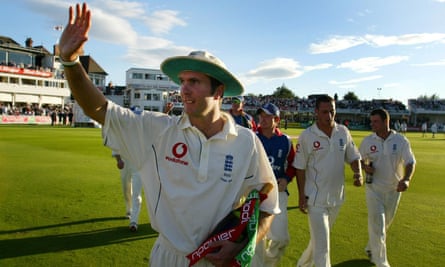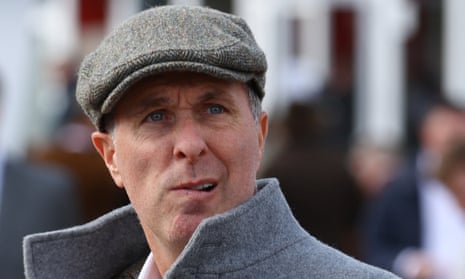I keep a photograph by my desk of England’s victory lap of the Oval after the last day of the 2005 Ashes. The friend who took it was drunk, so the outfield lists like the deck of a ship. It was shot on one of those disposable plastic cameras, but you can still pick out the players making their way around the boundary.
There’s Andrew Flintoff, one arm above his head, Marcus Trescothick, holding the little crystal replica of the urn, Steve Harmison, one hand throttling a bottle of champagne, and Michael Vaughan, dapper despite his tired whites. He has an England flag knotted around his neck. It hangs down his back like a cape.
It was taken at about a quarter-to-seven in the evening on 12 September, half an hour or so after the umpires had called off play on the final day of one of the greatest Test series, when England had beaten one of the best teams to play the game to win back the Ashes after 16 years.
They say cricket doesn’t build character, but reveals it. But you wonder how many of the millions who watched that series really had anything like a clear idea of the personalities of the men playing in it.
Fans are romantics, after all, and make heroes of their favourite players. In the years afterwards, we would get to know a little more about them all. Trescothick and Flintoff, who had seemed to be such easy and convivial people, opened up about their struggles with mental illness. We had Vaughan all wrong, too. There were no great revelations, rather a gradual unfolding of himself in his television and radio work, and on social media.
Still, over time the gap between the Vaughan we saw in 2005 and the one we have come to know in the years since came to seem an awful lot wider than the 100-odd yards between the grandstand seats and the pitch where we watched him go about his batting.
For an 18-month stretch in the early 2000s, he did that as well in Test cricket as any Englishman ever has: 100, 197, 195 against India at home, 177, 145, 183 against Australia away, and altogether more runs than anyone but Viv Richards had ever made in a single year. All in matinee idol style, with a high elbow, a handsome drive and a withering pull.
The captaincy took the edge off his form, but England gained something better anyway. As a young man at Yorkshire, Vaughan studied the senior players around him, Martyn Moxon, David Byas, Darren Lehmann, Michael Bevan and the rest, and borrowed something from each.
after newsletter promotion
As England’s captain he seemed, again, to combine the best qualities from people who had done it before him. From this side of the boundary he appeared to have a fertile mind, a feel for people, a keen sense of when and whether to take risks, a bullish self-confidence and, when he needed it, a steady bat.
If you could have frozen his life in that moment, in the late summer of 2005, he would be remembered now only as one of England’s very best captains. His winning percentage, a lick under 51%, is second only to Mike Brearley’s among people who did the job often.
Perhaps Vaughan’s great strength was that he was such a good blusterer he managed to convince what was, in reality, an utterly out-matched England team that they were capable of beating an Australia side including in Shane Warne, Glenn McGrath, Ricky Ponting and Adam Gilchrist a good handful of the truly great players.

There were signs of what was behind the bluff during his retirement years, which were oddly needy. There was a tearful press conference when he stepped down as captain and an awkward 11-month stretch when he insisted he still wanted to play on that ended in a row with Yorkshire’s former chief executive in a car park outside Headingley after the club refused to indulge him in a farewell run of games for their one-day team. It was followed by a string of embarrassing commercial deals, including a stretch when he was busy flogging artworks he had made by flinging cricket balls at a canvas.
It felt as if Vaughan’s ego had convinced him that having achieved as much as he did in the sport, his life after it owed him more than he had received. He inevitably drifted into punditry, where he could be brilliantly insightful when he was talking about the sport and an awful bore when he wasn’t.
Other England captains from his era shaped second careers as writers, analysts and administrators. Vaughan, apparently lost for anything better to do, tried to make his way as a media personality. He seemed to think the trick of it was in being witty, which he isn’t, and offering provocative takes on hot topics.
He is, you guess, one of the few people left using the word “banter” without irony. His most egregious tweets came up all over again during these Cricket Discipline Commission hearings, which cleared him on Friday of using racist and/or discriminatory language and bringing the game into disrepute.
Vaughan now says the words were “disgusting and awful and other words you could use”. It wasn’t clear if he was thinking of the one that feels most appropriate for them: stupid.
Vaughan’s act wore thin long before he finally seemed to realise that the only reaction it provoked in most cricket fans was to make them pine for that time back in 2005. But even here, there’s a sense that our idea of him isn’t quite right, that he’s still playing games. He’s just not as good at them as he used to be at the one that made him famous to begin with.
Ask his friends, and he has plenty in and out of the game, and they will tell you about a thoughtful, talented and affectionate man, full of bright ideas. You can only hope he decides to show it to the rest of us.

